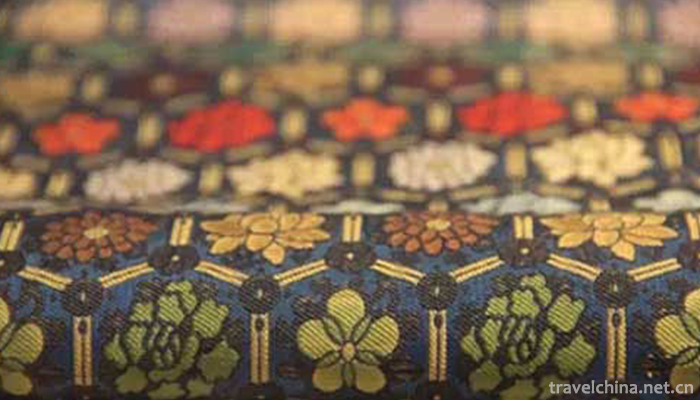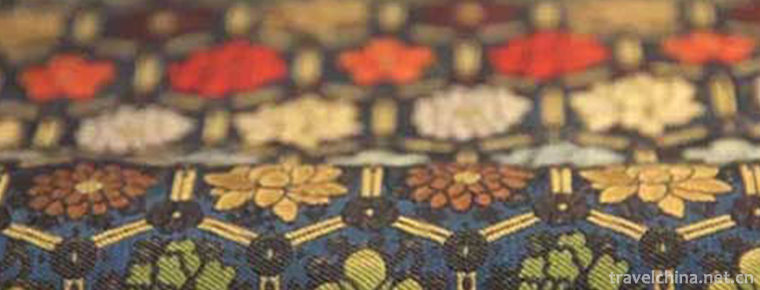Song Brocade Weaving Skills
Song Brocade Weaving Skills
Song brocade weaving technology, traditional handicraft in Suzhou City, Jiangsu Province, is one of the national intangible cultural heritage.
Song brocade weaving process is numerous, mainly through reeling, dyeing, weaving and other more than 20 processes.
On May 20, 2006, Song brocade weaving technology was approved by the State Council and listed in the first batch of national intangible cultural heritage list, project number_-14.
historical origin
The origin of Song brocade can be traced back to the Spring and Autumn Period. The nobles of Wu State, located in the south of the Yangtze River, have used brocade extensively in their lives. Over time
With the development of the Song Dynasty, brocade weaving skills were comprehensively improved in the Northern Song Dynasty. During the Tang and Song Dynasties, Suzhou became the center of silk production in China. In the Southern Song Dynasty, Suzhou established its own courtyard. At that time, a new variety of brocade with exquisite texture and unique skills appeared in Suzhou, namely, Song brocade of Suzhou. It was used not only for clothing and clothing, but also for mounting of calligraphy and painting scrolls. There were more than 40 kinds of brocade. Especially the application of mounted calligraphy and painting, so that these beautiful and luxurious brocade and painting treasures can be preserved together. So later generations talked about brocade will be called Song, Song brocade from this name, passed down.
During the Ming and Qing Dynasties, Suzhou also had the Suzhou Weaving House, whose production and marketing of court weaving and folk silk weaving were flourishing, known as "Northeast Half City, Wanhu Machine Voice". The use of Song brocade fabrics expanded, especially in the reign of Kangxi and Qianlong, when Song brocade reached its heyday. The "Brocade Axis of the Bliss World" collected by the Palace Museum is the heavy brocade produced in Suzhou during the Qianlong period.
Technological characteristics
Song brocade is rich in color and has distinct layers. It does not need strong contrast colors, but uses several similar layers of colors to render halo. Its background color mostly uses beige, blue grey, mud gold, Lake color, etc. The characteristics of the main flower's stamens or patterns are moderate and bright with special colors, while the small patterns of the flowers wrapping or separating two kinds of colors are coordinated and neutral. The ingenious cooperation of various colors forms the solemn and beautiful style of Song Jin, which is suitable for halo rendering, complex but not disorderly, elegant and harmonious, and antique.
Technological process
There are many production processes in Song brocade, which usually go through more than 20 processes, such as silk reeling, dyeing and weaving. With the combination of warp and weft, Song and Jin dynasties, and the unique technique of color change by color throwing, the fabric surface color lines and organizational layers are more abundant. This technique was borrowed by Yunjin later, and has been popular in contemporary brocade weaving techniques.
The traditional Song brocade is woven on jacquard wood machine with two warp shafts and nine syntheses of ground warp and face warp. The ground is controlled by six synthesizers and the surface is controlled by three synthesizers. The motion of the heddle is controlled by six pedals, of which three pedals are connected to two heddles at the same time (because the two heddles are connected to rise and fall at the same time) in order to reduce the density of the heddle line. When weaving, there are twisters on top and weavers on the bottom, echoing from top to bottom, dispatching heald frames and throwing multi-color weft shuttles in exchange. Now, in weaving Song Jin, the pattern jacquard machine has been used instead.
Inheritance and Protection
Inheritance value
Song Jin is not only an important part of Suzhou's excellent traditional silk culture, but also an outstanding representative work of Chinese traditional silk skills, which has high historical and cultural value.
Song brocade has a high historical and cultural value. Although it has evolved for thousands of years, it is still famous at home and abroad for its simple and elegant style and unique artistic charm.
Current situation of inheritance
Due to the economic transformation and long-term neglect, traditional Song brocade handicraft workshops have been discontinued, and artists, tools and patterns are seriously lost. It is urgent to take effective measures to restore and protect them.
Heritage figures
Qian Xiaoping, Han nationality, born in September 1939 in Wujin County, Jiangsu Province. In June 2007, Qian Xiaoping was selected as the representative successor of the first batch of national intangible cultural heritage projects and declared in Suzhou, Jiangsu Province.
protective measures
Suzhou has established the first industrial park with Song brocade as its theme in China, the Song brocade Cultural Industrial Park in Suzhou, including the exhibition of Song brocade (silk) cultural boutiques, the exhibition of silk production technology of Song brocade and Wujiang intangible cultural heritage, etc.
social influence
Important Exhibitions
From April 16 to 28, 2015, "The Exhibition of Traditional Weaving, Embroidery and Dyeing Techniques in Jiangsu Province" was held at Gongwangfu, Beijing. Wujiang Dingsheng Silk, along with APEC Leader's Clothing, Song Jin Luggage and Song Jin Brocade and Brocade Painting, etc., appeared on the exhibition site. Because of its exquisite texture and unique craftsmanship, Song brocade weaving technology extension products have attracted a large number of tourists to stop and appreciate.


-
1.Yibin burning Noodles
The Yibin burning Noodles is one of the most distinctive traditional snacks in Yibin
Time 2018-10-12 -
3.Xiangsha Bay Scenic Spot in Dalat Banner Ordos
Xiangsha Bay was opened as a tourist attraction in January 1984, listed as a national line scenic spot by the National Tourism Administration in 1991
Time 2018-11-29 -
4.Lianhuashan Ski Resort
Located in Zhangzhen, Shunyi District, Beijing, Lianhuashan Skiing Ground covers an area of more than 1 million square meters and was opened on December 19, 2003.
Time 2019-01-29 -
5.Xiaolangdi Yellow River Three Gorges Scenic Area
The Three Gorges Scenic Area of the Yellow River in Xiaolangdi is a world geological park, a National Water Conservancy Scenic area, the most attractive place in China, ten hot spots in Henan Province
Time 2019-02-25 -
6.Midu folk songs
"Midu Folk Song" is the general name of the Han and minority folk songs in Midu County, Yunnan Province. Midu folk song is a multi-cultural complex system, which is the convergence and cohes
Time 2019-06-04 -
7.Qijia Yanxi
"Qijia Yanxi" is a long narrative poem in Tu folk literature. It records the eleventh generation of Qi Tusi Chief Qi Yanxi in the history of Tu people, despite his old age and physical decli
Time 2019-06-10 -
8.Legend of Xishi
Xishi is the first of the four beautiful women in ancient China. The legend about Xishi was born at the end of Spring and Autumn Period, and has been enriched ever since. Xishi legend takes the war be
Time 2019-07-01 -
9.Henan Opera
Henan Opera, originating in the Central Plains (Henan), is one of the five major Chinese operas and the largest local opera in China. Contemporary Henan Opera has followed Henan Satellite TV, Henan He
Time 2019-07-16 -
10.Chengdu University
Chengdu University, established in 1978 with the approval of the Ministry of Education, is a comprehensive University jointly built by Sichuan Province and Chengdu City. It is a key comprehensive univ
Time 2019-08-31 -
11.Animal resources in Leshan
The composition of the wild fauna in Leshan City is located in the transitional zone between the Palaearctic realm and the Oriental realm. It is mainly composed of the southwest region and central China region of the Sino Indian subregion in the Oriental realm.
Time 2020-12-17 -
12.Meishan primary industry
In 2019, the total sown area of crops is 318000 hectares, an increase of 1.1%. Among them, the planting area of grain crops was 196000 hectares, an increase of 0.6%; the planting area of oil crops was 58000 hectares, an increase of 1.8%; the planting area
Time 2020-12-18